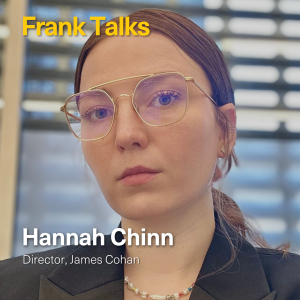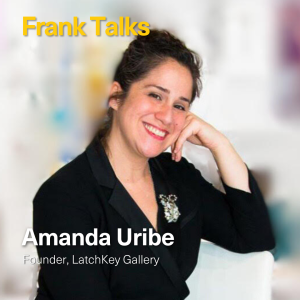John Duff is the Head of Marketing at Artlogic, the leading online business and sales platform for galleries, artists and collectors with over 3,800 clients worldwide. He is responsible for all aspects of Artlogic’s marketing efforts, including strategy, advertising, media relations, brand positioning and client communications. John joined Artlogic in 2019, having previously held positions at Faye Toogood as Head of Client Services, Head of Creative at Psycle London and marketing positions at several London design agencies. He holds a BA(Hons) in Fine Art from Central Saint Martins and is passionate about helping people and brands to tell their stories.
Tell us a little more about yourself. When did you realise you wanted to pursue a career in this industry?
After graduating, or perhaps even before that, I had realised that being an artist may not be plausible – it was 2011, and the financial crash and austerity had made it feel like an impossible dream. I dabbled in working at a gallery and an art shipping company but neither offered any creative output. Luckily my artistic practice focused on video and moving image, so I was able to use these skills, plus my love of telling stories, to land a job as an Editor at a creative agency. I can’t put into words how much this first experience shaped me; I fell in love with the process of collaborating with other creative people, and the team there were so supportive and loving (I’m lucky to still count the CEO as a friend). I learned about the many different sides of marketing, and how design agencies operate – and I knew that I would take a detour from the art world for a few years to learn as much as I could for as long as it felt interesting. I then had the amazing opportunity to work with the artist Faye Toogood, and I knew that it was my time to jump back into the world of art and design.
What was your first job in the Arts and what was the most useful or important thing you learned in that experience?
I interned (unpaid – as was expected in those days…) at a gallery in Fitzrovia. The most important lesson was that it is not a viable long-term option to work for free in the day and at night as a bartender. Whilst I had to give up on the internship, my short time in the role did teach me the importance of training – it’s a really valuable investment for any company, in any sector and at all levels.
Where are you from and what is the arts community like there? Has your upbringing shaped what you do in the arts today?
I grew up in both London and Surrey. I’m sure you don’t need me to explain the wonders of the art scene in London – but growing up in and around the city taught me to appreciate that things are constantly changing and moving forward – and that you have to be okay with the fact that things don’t last forever.
You’ve worked in a variety of creative roles, what attracted you to Artlogic?
I’m a huge believer that there isn’t one set path that you have to follow, and that you should try as many things as possible. I knew that working for Artlogic would bring together three of my great loves: technology, art and telling stories. Even after a few years of working here, I am still so excited about what we are working on to transform the industry. I couldn’t be happier about our next chapter. I am particularly excited about working on some of our projects that are aimed at helping galleries, artists and creatives to market themselves better!
What has been the greatest challenge of leading Artlogic’s Marketing Department throughout the ongoing pandemic?
My focus was to make sure that we were communicating all of the ways we could help our clients. As a company, we put a huge effort into responding to our clients’ online needs – and during the pandemic, we doubled down on this, whether that was rapidly developing products like standalone OVRs or running webinars to help clients to utilise all of the tools on our platform. Whilst it was a challenge for us, it was nowhere near the challenge that a lot of our clients were facing at the time. There was a sense of relief/reward when we saw our efforts translated into our clients’ businesses as they developed an online presence, launched their first online exhibition or sent out their first email campaign to collectors.
What is the best piece of advice you can give about working in the art world?
Know your worth, and don’t feel intimidated to ask questions or offer your own opinion.
What do you think defines a good employee? And what defines a good supervisor?
As an employee, you need to take the temperature of the room and check that you are in a team that is invested in your growth – only then can you be a ‘good employee’. If you don’t have support from the top, you’ll never meet their needs or feel fulfilled. When you feel supported, that’s when you can invest your time in sharing, learning, and positively impacting the business. Remember, everyone above you learned from someone else and has adapted it along the way, which means things can change, so speak up when you think you can improve the business. Find your voice, contribute by bringing your experiences to the table, always make sure you know your deliverables, and never be afraid to ask for help.
A good manager needs to learn how to listen, train, delegate and empower people to fulfil their roles. Make time to check in with your team, don’t prejudge situations and be open to feedback. Never forget that no matter how junior an employee is, they can offer valuable insights into your business; how it may be performing, what might need changing urgently, or areas of potential growth. It is often too easy to confuse an absence of experience with a lack of common sense or good gut instinct. Occasionally the quietest voices can have a profound perspective. Be open to change, allow people to challenge you and leave your ego at the door. Just because you’ve learnt how to do something one way doesn’t mean it’s the only way.
The word ‘training’ often fills people with dread. It can sometimes feel time-consuming, and that you could be doing more valuable things, but that is short-term thinking. You’ll save more time in the future when other people can take responsibilities off your plate. Remember never to delegate unless you’ve invested the time in training and you are clear on your expected outcomes. Celebrate your team’s smallest wins, make people feel included and treat them with respect. Richard Branson puts it perfectly, “Train people well enough so they can leave, treat them well enough, so they don’t want to.”
And lastly, make work fun and fabulous. Life is too short not to.
What are you most excited for this year at your company or in the art world as a whole?
We recently welcomed ArtBase, exhibit-E and galleryManager into the Artlogic family, and I am really excited to work alongside their teams to create even better products for the market.
How do you think the art world can become more transparent?
There are so many areas where transparency can play a role, but, sadly I don’t think there is a magic ‘transparent’ button the art world can push. It will only happen if collectors, buyers and dealers are willing to push for it.
How do you think art should be shared and/or experienced moving forward?
In whichever way you can access it or feel comfortable experiencing it. Galleries have had to adopt a more hybrid model over the past few years in reaction to the global pandemic, so it will be interesting to see how this continues, and if different, wider or more diverse audiences will be attracted to art as a result.
If you could own work by 5 different artists, who would be in your collection?
Douglas Gordon, Bjarne Melgaard, Adam Peacock, Mame-Diarra Niang & Faye Toogood. But there are many, many more!




